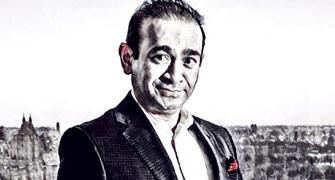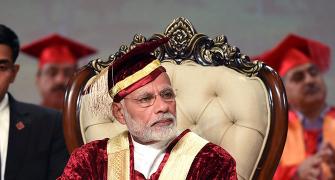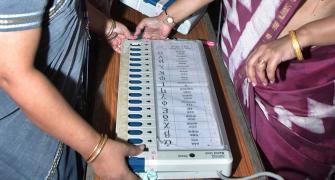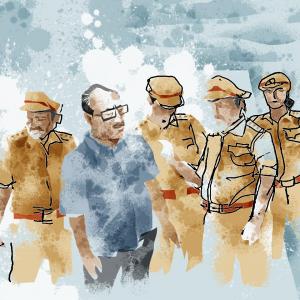'No commercial bank will be allowed to fail. There is nothing to worry about'
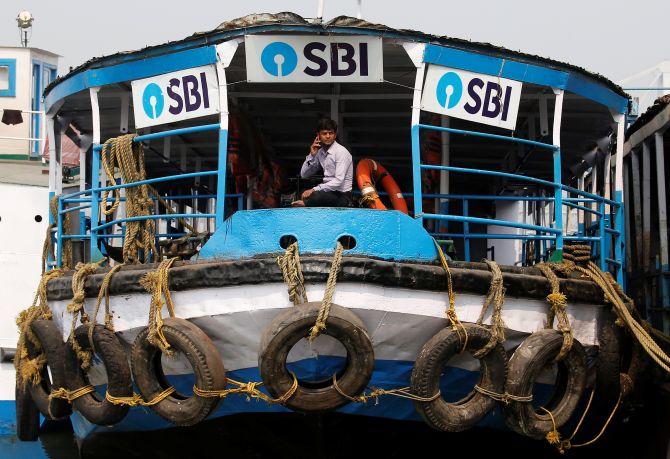
"Historically, whenever a bank comes on the verge of a collapse, the RBI steps in and makes sure that the troubled entity is taken over by a relatively stronger bank," Tamal Bandyopadhyay, whose latest book Pandemonium: The Great Indian Bank Tragedy highlights the rot in India's banking system, tells Syed Firdaus Ashraf in the concluding segment of a fascinating two-part interview.
In your book you mention that public sector bankers fear 3 'Cs -- CBI, CVC, CAG. Was there no fear in their minds at the time of giving bad loans?
If you are saying the bankers are not afraid of giving 'bad' loans, you are implying they are compromised. That is not a fair assessment. Bad loans are not given; some of the loans turn bad.
How and why? There could be many reasons behind that, including frauds. There are many cases when a genuine commercial decision (to lend) turns bad. Then, there are issues with project appraisal and monitoring of loans by banks.
Banking is a business where every loan cannot be performing; there will always be some loans turning bad -- because of collapse of the market, business cycle turning bad, banks's inefficiency and lack of expertise and skill in project appraisals and monitoring as well as fund diversion by the borrowers.
There are a few odd cases where the bankers seem to be compromised.
The investigative agencies need to be discreet in their approach. They can't smell a rat in every loan turning bad.
In such a scenario, the bankers stop lending. This has happened in India. Nobody is hauled up for not lending.
So, it is better not to lend than lend and be hounded by the investigative agencies for a few decisions turning bad. That's how the bankers look at this phenomenon.
Banks have three line of defence -- internal control, risk management, and audit. So how did everyone fail in not noticing the bad condition of banks?
There are many reasons behind this. In the case of a couple of private banks, it is misgovernance by rogue promoters and compromised professionals.
As far as public sector banks are concerned, the reason could be the banks's obsession for balance sheet growth.
Irrespective of their size and risk appetite, they banks were driven by a herd mentality -- the smaller banks were following the footsteps of their big brothers till they got into the mess.
Public sector banking is all about targets. These targets are first set by the government and reinforced at different levels in the bank's hierarchy.
The quality of lending and recovery isn't as important as achieving the loan targets.
Also, there were holes in the RBI's supervision and inspection.
One question that is often in the public's mind, is my money safe in nationalised banks?
Can nationalised go the way of the Punjab Maharashtra Co-operative Bank, and will depositors not get their money back?
Is keeping money in nationalised banks safer vis-à-vis keeping it in co-operative or private banks?
Yes, if not technically, for all practical purposes, your money is safe with nationalised banks. Or, for that matter, in any commercial bank.
Since economic liberalisation in the early 1990s, not a single commercial bank has been allowed to fail.
Historically, whenever a bank comes on the verge of a collapse, the RBI steps in and makes sure that the troubled entity is taken over by a relatively stronger bank. This has not been the case with the cooperative banks.
Recently, the deposit insurance cover has been raised to Rs 5 lakh. This means, if a bank fails, a depositor can get up to R s5 lakh.
One can play safe and split the money among family members and keep more than one deposits with a bank for one's self, spouse and children.
Also, one can keep deposits with more than one bank.
Since 2018, at least on three occasions, the RBI issued a release saying our banking system is safe. The state of affairs in one particular large private bank, a few NBFCs and a multi-state cooperative bank had created panic among depositors. There was a trust deficit.
No commercial bank will be allowed to fail. There is nothing to worry about.
Banks lend money to promoters and take a risk. And if the promoters blow up the money, should the blame then go only to the bank officers who sanctioned the loan?
Yes, the rogue promoters must also share the blame. The investigative agencies do chase them too.
And under the new insolvency code, such promoters run the risk of losing their business empire. Unlike some of the developed markets, in India the failed promoters cannot bid for their companies.
What does HDFC Bank do right that all our nationalised banks put together don't? What lessons do these banks need to learn from HDFC Bank?
It is all about managing risks. Kotak Mahindra Bank too manages it well. Both these banks are highly valued because their quality of assets is far better than others.
One caveat, though: The private banks can pick and choose who to lend and who not to, but the government-owned banks do not have much choice. Often, they are directed to take exposures to certain sectors which any prudent banker would not like to do.
Do you feel privatisation of nationalised bank is the solution to overcome this crisis?
The government feels consolidation is the answer. It has also 'privatised' one bank by asking LIC to be the majority owner of this bank!
I think there are two options for the government and the RBI. They can allow 'fit and proper' Indian private entities and foreign institutions, including private equity, to invest and own 26 per cent in banks. Anyway, such entities already own even higher stakes in the shadow banking system.
The second option is the creation of a banking investment fund on the lines of the National Investment and Infrastructure Fund which could invest up to 26 per cent in banks. NIIF is an investment platform that has brought together the Government of India and international investors, looking for opportunities in infrastructure.
The government is trying to re-capitalise banks by infusing Rs 20,000 crore. Is the amount good enough to wipe out the bad debts of banks or do they need more? &
And do you feel it is a good idea to re-capitalise banks?
Does the government have any choice? Under international norms, banks need certain amount of capital without which they cannot function.
Eleven banks were put under the so-called prompt corrective action or PCA of the RBI and restrained from fresh lending because of their pile of bad loans and lack of capital.
Unless they are capitalised, they cannot lend.
Yes, taxpayers's money is being used to run the banks, but unless they are closed down or privatised, the government would need to keep on infusing capital.
The Economic Survey 2019-2020 has analysed the overall government investment in PSBs and returns earned. Going by the survey, at least Rs 4.3 trillion of taxpayers's money is invested as the government's equity in PSBs.
In 2019, every rupee of taxpayer money invested in PSBs, on average, lost 23 paise. In contrast, every rupee invested in the so-called new private banks -- the banks licensed after the 1991 liberalisation -- on average gained 9.6 paise.
The notional opportunity cost loss is therefore 32.6 paise (23 paise plus 9.6 paise) for every rupee invested in the PSBs. For Rs 4.3 trillion, the amount equates to Rs 1.41 trillion.
Lastly, among the various cases you have highlighted, which was the most difficult to research, with information most difficult to obtain?
Overall, writing this book has been extremely challenging. This is because I wanted to tell the story -- and not indulge in an academic exercise.
You can only weave an interesting story when you have every detail on your table. In some sense, I have taken two decades to write this book -- ever since I started my column in Business Standard some time in 2000. Those days, it appeared on every Thursday, but it did not have any name. From February 2007, 'Banker's Trust' started.
I have interviewed four past RBI governors for this book, but off-record I may have spoken to at least 400 professionals from the central bank, commercial banks, corporate India, judiciary, rating agencies, investigative agencies, bureaucrats, economist, analysts... It has been quite a task.


